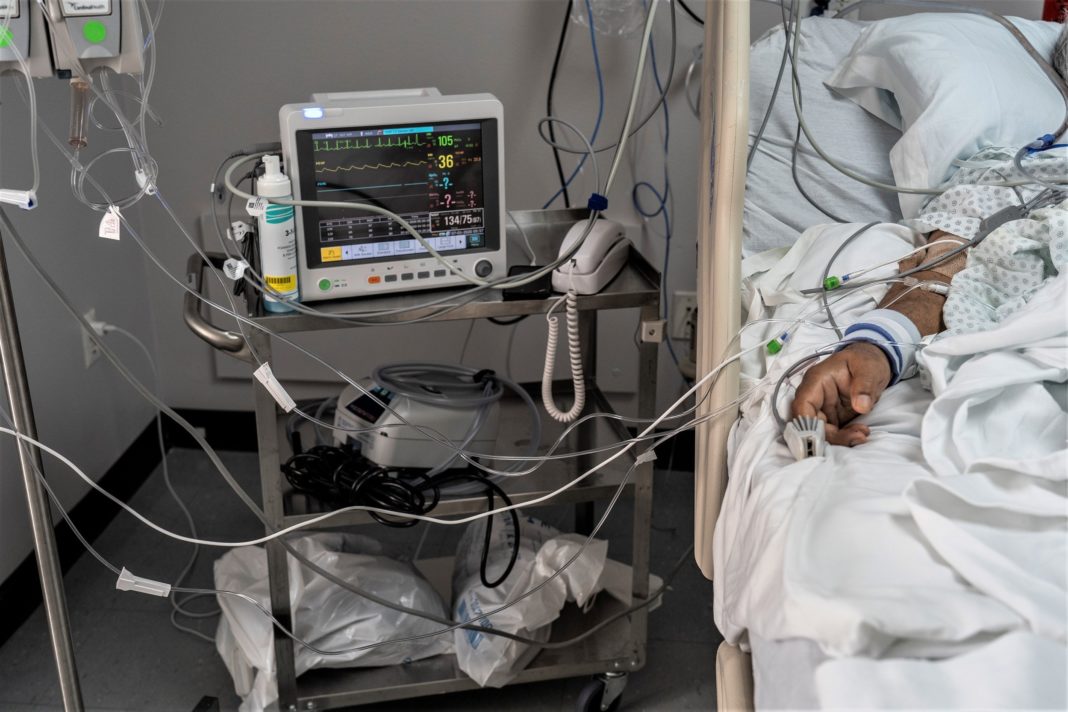New studies show that treating critically ill COVID-19 patients with inexpensive steroids can cut their risk of dying from the illness by a third. The results are so clear that the World Health Organization changed its advice on Sept. 2 and now strongly recommends corticosteroids as a first-line treatment for the sickest patients.
Steroids aren’t risk-free, however. They can have side effects, and they could do more harm than good in patients with milder cases of COVID-19.
I am a pulmonologist and critical care physician and co-author of one of three new studies that analyzed data from clinical trials involving the effect of steroids on thousands of critically and severely ill COVID-19 patients. Here’s what people need to understand about steroids as a treatment for COVID-19.
Who benefits from taking steroids?
It’s important to understand that steroids can benefit the sickest patients hospitalized with COVID-19, but they’re not a treatment for relatively mild cases.
With COVID-19 and other infectious diseases, there are two key components: the infection itself and the body’s response to that infection.
In the sickest patients, the body’s immune system response is so robust it can injure organs. So, calming the immune response may be important. But someone who is less severely ill may need the body’s immune response to prevent the infection from getting worse. You wouldn’t want to interfere with the immune response unless it was harming the patient.
How do corticosteroids help critically ill patients?
When an infection triggers an inflammatory response, specialized white blood cells are activated to go find the virus or bacteria and destroy it. It’s more of a bomb effect than a targeted missile strike – the immune cells attack broadly, and the inflammation created can damage other cells in the vicinity.
That response can get out of control and continue even after the infectious agent is gone. In a really exuberant immune response, the patient can have respiratory failure and end up on a ventilator, or have circulatory failure and end up in shock, or they could develop kidney failure from the shock.
In patients with severe COVID-19, corticosteroids are likely able to calm that inflammatory response and prevent the progression of organ damage, potentially in the lungs.
Scientist aren’t yet certain that that is how steroids are working. What we do know from the new studies is that people with severe COVID-19, particularly those with respiratory complications, benefit from relatively low-dose courses of corticosteroids. A combined analysis of the recent studies found the death rate four weeks after infection was significantly lower in patients with severe COVID-19 who received steroids than those who did not.
Why does the World Health Organization recommend not using steroids for cases that aren’t severe?
No treatment comes without risk.
Steroids are well-known immune-suppressing medications that have been used for decades. They’re commonly used for treating chronic diseases that are inflammation-related, like asthma, or autoimmune disorders such as lupus or rheumatoid arthritis. But there may be consequences.
The potential harms from using steroids in a hospital include an increased risk of bacterial or fungal infections, hyperglycemia, acquired muscle weakness and gastrointestinal bleeding.
For people with milder cases of COVID-19, taking steroids could mean increasing their risks with little potential benefit.
Taking steroids long-term also carries other risks, including predisposition to infection and developing osteoporosis, cataracts and glaucoma. So, to take steroids as a potential preventive measure against COVID-19 could come with significant potential risk to otherwise healthy people.
Do steroids carry risks for critically ill patients?
It’s common for ICU patients, particularly those on ventilators, to develop hospital-acquired infections such as pneumonia or bloodstream infections related to intravenous catheters. Being on corticosteroids can increase a patient’s risk of developing secondary infections, or it can contribute to muscle weakness which may impact the patient’s ability to come off of a ventilator when the disease resolves.
Still, the benefits of steroids for treating critically ill COVID-19 patients appear to outweigh the harms.
How large should the dose be?
Part of the challenge in treating critically ill patients with steroids is determining the dose and timing of the medication.
In the context of this study, the dose of steroids is relatively low and it’s also a short duration. The trials haven’t shown a significant increase in adverse events in the context of using the short-course, relatively low dose of steroids. So, in that patient population, the benefit outweighs the risk, but the risk is not zero.
The risk profile increases with higher doses. So, the recommendation would be to start with the relatively low doses that have been studied. The WHO recommends low doses for 7-10 days.
Which steroids are most effective?
I don’t think it matters which corticosteroid is used as long as the steroid has some glucocorticoid activity.
The REMAP-CAP study looked at hydrocortisone. Another trial involved dexamethasone, the steroid the president was given. Others studied methylprednisolone, though they were smaller and provided less data. The trials all point in a similar direction, suggesting the anti-inflammatory glucocorticoid activity is the important feature and not the specific steroid.
How will this new advice change treatment?
Based on the studies to date, hospitalized patients with COVID-19 pneumonia and requiring oxygen should be started on a low-dose course of steroids. That should certainly be the case if they’re in the intensive care unit and require more intensive organ support, such as being on a ventilator, receiving non-invasive ventilation, or receiving high-flow oxygen.
Importantly, however, steroids have not been shown to benefit asymptomatic patients with COVID-19 or patients with mild disease without pulmonary problems based on the data we’ve seen so far.
Physicians should think of steroids at low doses as the standard of care for critically ill patients with COVID-19 pneumonia.


